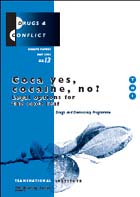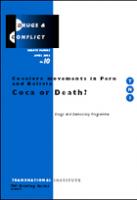In its annual report, released in March, the International Narcotics Control Board (INCB) called on the governments of Peru and Bolivia "to initiate action without delay with a view to eliminating uses of coca leaf that are contrary to the 1961 Convention." The report emphasizes the role coca leaves "play in the progression of drug dependence," and claimes that growers are supplying the international narcotic trade.
The governments of Peru and Bolivia rejected these controversial statements, saying, instead that coca leaf is a sacred symbol for indigenous people, which should be protected as a cultural heritage of the Andes. According to a suppressed WHO report, the traditional use of coca leaf has no significant health risks but has many nutritional and medicinal benefits. The government of Bolivia calls for the revision of the status of coca, which is listed among narcotic substances like cocaine and heroin.
We interviewed a representative of the Bolivian government at the 51st Session of the Commission on Narcotic Drugs (CND) in Vienna on his position on the Andean leaf and its possible future regulation. Mr. Felipe L. Cáceres, the Vice Minister of Social Defence of Bolivia, explained that in the view of the current government, coca chewing is a cultural tradition rather than a drug use. Therefore, the government supports the legalization of coca but implements a strict anti-cocaine policy.
Consequently, we, as well, do not consider coca a drug, nor do we believe that the leaf should be legalized at the cost of demonizing cocaine users. Nevertheless, we support the struggle of the Bolivian people to stop the war on coca and reclaim respect for both the sacred leaf and the heritage of their ancestors.
WATCH OUR VIDEO ON YOUTUBE AND TELL INCB WHAT YOU THINK:
Further readings on coca leaf and coca policies from the Transnational Institute:
Posted by Peter Sarosi

